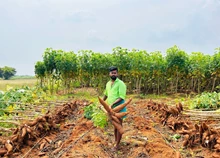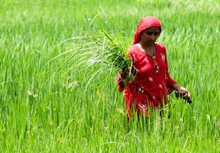
Climate change is one of the most pressing challenges of our time, with far-reaching consequences for ecosystems, economies, and livelihoods. Among the sectors most vulnerable to climate change is agriculture, which is heavily dependent on climatic conditions for crop growth, water availability, and overall productivity. The interplay between climate change and agriculture manifests in various ways, from shifts in weather patterns to altered growing conditions and increased frequency of extreme weather events.
Even a small change in climate affects agriculture adversely and decreases the production rate. Climate change increases the average atmospheric temperature which has become a mega trend changing the global future significantly. In 1972, the Club of Rome report officially confirmed that global warming is an international issue; and the World Meteorological Organization (WMO) and United Nations Environment Programme (UNEP) also declared that Carbon dioxide (CO) is the principal cause of climate change because of its highest contribution in global warming.
Furthermore, economic losses from natural disasters are rising globally, and the agriculture sector is highly vulnerable to these disasters. According to the United Nations Office for Disaster Risk Reduction (UNISDR) (2018), disaster-hit countries experienced direct economic losses to the tune of US$ 2908 billion during 1998–2017. Of the total losses, 77 percent were due to climate-related disasters. Climate change impacts have been more pronounced in the agriculture sector in the recent past. The government of India's economic survey (2018) estimated that the annual loss of US$ 9-10 billion was due to the adverse effects of climate change.
To effectively tackle the challenges presented by climate change in agriculture, it is essential to deploy adaptive measures. This includes the development of crop varieties resistant to drought, enhancing water management strategies, embracing sustainable farming methods, and investing in infrastructure resilient to climate impacts.
Moreover, it is imperative to prioritize efforts aimed at mitigating climate change by curbing greenhouse gas emissions. These actions are vital for securing the sustainability and resilience of agricultural and food production systems in the long term. The World Bank also has significantly scaled up its engagement and investment in climate-smart agriculture (CSA).
How Farmers Are Adjusting to the Uncertainties of Climate Change
Expansion of Crop and Livestock Variety: It is one of the most effective strategies farmers use to adapt to climate change. They mitigate risks linked to unpredictable weather patterns. This approach not only safeguards against crop failures but also promotes soil health while curbing the spread of diseases and pests. Farmers are actively exploring novel crop varieties adaptable to evolving conditions and tapping into niche markets for specialty crops and livestock breeds.
Precision Agriculture and Technology: Tech-based advancements have played a crucial role in enabling farmers to cope with climate change. Precision agriculture techniques, including GPS-guided tractors and drones, help farmers optimize their use of resources like water and fertilizers. By using data-driven insights from weather forecasts and soil analysis, farmers can make informed decisions about the timing of planting, irrigation, and harvesting, thereby reducing waste, and increasing efficiency.
Sustainable Farming Practices: Utilizing methods such as conservation tillage, crop rotation, and cover cropping aids in carbon sequestration, enhancing soil health, and minimizing water consumption. Moreover, sustainable farming techniques play a role in preserving biodiversity, which is crucial for bolstering ecosystem resilience against climate change.
Irrigation Efficiency: Farmers are adopting new irrigation techniques to use water more efficiently due to the growing scarcity and uncertain availability of water resources. Methods like drip irrigation, collecting rainwater and using sensors to monitor soil moisture help farmers manage water better. Additionally, systems for recycling and storing water enable farmers to save extra water during rainy times and use it later when water is scarce.
Using Forecasting and Early Warning Signs: Having access to precise weather forecasts is crucial for farmers to make timely decisions. Climate change's unpredictability has raised the need for dependable, localized weather updates. Nowadays, many farmers depend on weather applications and services that provide real-time and customized forecasts for their exact locations.
Government Policies and Support: Policies are important in helping farmers make adaptations to climate change. Many countries are implementing policies and incentives to encourage sustainable farming practices, provide financial support during extreme weather events, and promote research and development of climate-resilient crops. Farmers are actively engaging with policymakers to ensure they address their concerns and needs in climate-related legislation.
Initiatives for Climate Change Adaptation in India
The nation has taken proactive measures to address climate change issues, focusing on the impact on major food crops, horticulture, and livestock. Initiatives like the National Mission for Sustainable Agriculture (NMSA) aim to ensure food security, livelihood enhancement, and economic stability through sustainable farming practices and adaptation strategies. The National Livestock Mission (NLM) and National Fisheries Development Board (NFDB) also prioritize sustainable production and environmental conservation.
The National Initiative on Climate Resilient Agriculture (NICRA) focuses on research and demonstration of climate adaptation measures across vulnerable districts. Efforts include capacity building, promoting climate-resilient crop varieties, and implementing water and nutrient management practices. Integrated Farming Systems (IFS) and agro-forestry are being encouraged for greater resilience against extreme climatic events. Additionally, initiatives like the Prime Minister Crop Insurance Scheme aim to provide financial protection to farmers against crop losses due to natural calamities.
Critical Challenges Due to Climate Change
- Water availability Deterioration of water quality
- Increased frequency and intensity of extreme weather events
- Heat stress
- Unpredictable changes in pest and disease load
Addressing the trials posed by climate change requires bridging existing knowledge gaps and focusing future research efforts in key areas. This includes enhancing the prediction of future climate with greater accuracy and lower uncertainty to facilitate reliable impact assessments. Efforts are needed to develop mitigation and adaptation strategies for Indian agriculture at various scales, emphasizing resilience-building and vulnerability reduction. Collaboration between developed and developing countries, supported by funding, is essential for developing and transferring climate-smart technologies.
Socio-psychological empowerment of farmers and building competencies in adaptation practices are crucial for effective adaptation strategies. Reorienting land use and agriculture with advanced technologies and policy initiatives is necessary to ensure food security and address climate change challenges.
Finally, assessing the costs of adaptation and economics under different climate scenarios is important for scaling up adaptation options. With this, developing a policy framework for implementing adaptation and mitigation measures is vital to safeguard farmers from the adverse impacts of climate change.











